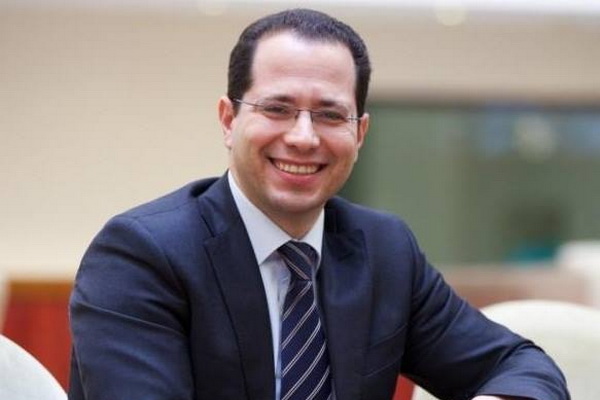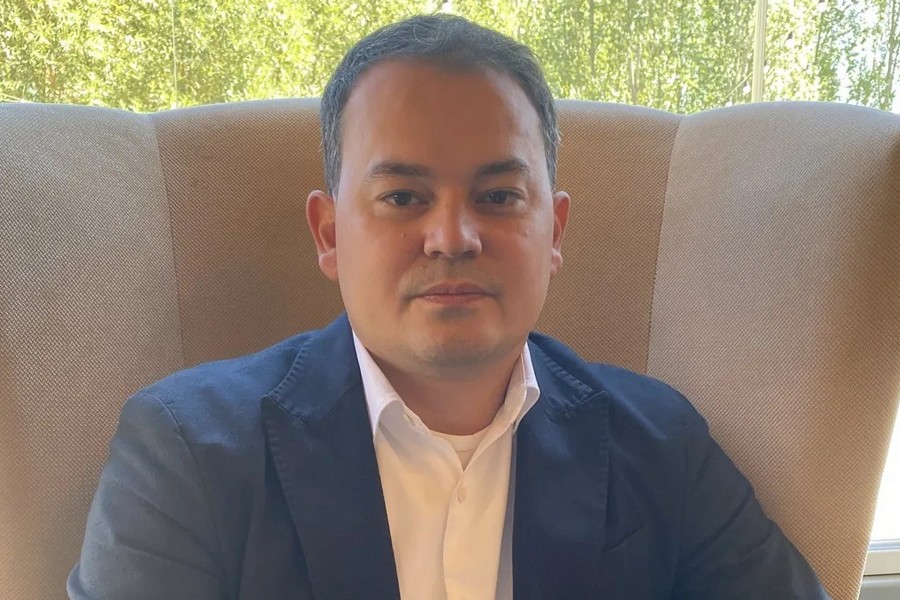Director of the Center for Integration Studies of Eurasian Development Bank Evgeny VINOKUROV:
THERE WILL BE NO TENGE DEVALUATION AS LONG AS OIL REMAINS AT $50 A BARREL

In the medium term, the tenge will remain relatively stable, unless, of course, sharp fluctuations in the price of black gold occur. Meanwhile the current rate of Kazakhstan’s national currency can be called equilibrium rather than undervalued. Director of the Center for Integration Studies of Eurasian Development Bank Evgeny VINOKUROV told Interfax-Kazakhstan about that.
- Some analysts forecast 420 tenge for one dollar by the end of the year, arguing that Kazakhstan will have to make up for losses related to saving Kazkom [Kazkommertsbank] and holding an EXPO exhibition. Do you agree with this opinion?
- We deem that the tenge is valued efficiently, in an equilibrium state. No one can say that it is undervalued or overvalued relative to the equilibrium rate, this is very much facilitated by the floating rate. After the 2014-15 currency crisis Kazakhstan, like Russia, switched to the tenge free floating, and under these conditions the market dictates an exchange rate and we, like many others, believe this is the optimal policy.
The National Bank of Kazakhstan conducts one-off interventions aimed at smoothing out excessive volatility. The National Bank carries out an intervention only when it knows that, say, a large exporter comes up with some kind of one-off release or purchase. This is acceptable within the free floating regime.
Kazakhstan has sufficient reserves, and when the country has enough, the situation is comfortable. If there is any need to sustain some unforeseen large expenses, it is better to spend reserves than to print money. And Kazakhstan has such a possibility.
That’s why we do not expect such a strong fall of the tenge. It can happen only if oil falls very badly [in price]. No one can say whether it will fall strongly tomorrow or not because the short-term and long-term dynamics of oil prices are not fundamentally predicted, in my opinion. Somehow you can predict long-term trends for 10 and 20 years ahead based on a fundamental understanding of supply and demand. But for the short-term period no one is able to forecast oil.
Assuming that oil will be as it is now – around $ 50 - then we do not expect the devaluation of the tenge. Our chief economist’s team gives the following forecasts. For this year - 317 tenge for $ 1, for next year - 327 tenge. With the floating regime fluctuations of +/- 5% is the norm.
- How do you assess the effectiveness of the inflation targeting policy applied in Kazakhstan?
- The 2014-2015 currency crisis - when the price of oil plummeted, and, accordingly, the tenge and the ruble collapsed - had a sobering effect on the monetary and lending policies in our countries. As a result, the model of monetary policy was changed: both Kazakhstan and Russia switched to free floating. We believe that inflation targeting and free floating is the right combination, and our monetary authorities are on the right track.
The long-term inflation target of the National Bank of Kazakhstan is 3-4%. One cannot think that it will be achieved exactly tomorrow. It will take time - the economy is big, cannot respond so quickly to incentives. Our bank forecasts 7.5% inflation for this year and 6.5% for next year. That is, the move towards the long-term target is under way. For comparison, in Russia free floating and inflation targeting began earlier and are being applied, perhaps, more harshly. As a consequence, the 4% target has already been achieved. In Russia for several months, annual inflation has been at about 4%, plus or minus 0.5%. So I think that Kazakhstan will reach its inflation target some time later.
And when this happens, the situation in the economy will get an additional stimulus. After 25 years of living with high inflation it is difficult for us to imagine the situation when inflation is at 4% in the country. If it is 4%, then the deposit rates will be 5%, and the rates for enterprises in the economy will be 8%. This will provide impetus for the economy.
- How soon can Kazakhstan achieve such indexes?
- It is hard to say. The economy is a too multidisciplinary thing. Maybe, within 2-3 years or earlier, this is my personal guess.
- In the next two or three years should not the devaluation be expected in Kazakhstan?
- Our economists, based on the oil price forecast at $48-$50, forecast such tenge rate against the dollar. If there is no sharp volatility in oil prices – Kazakhstan is the oil-based economy, like Russia - it is not worth predicting the tenge sharp devaluation or strengthening.
- How do you assess the ongoing policy of de-dollarization in Kazakhstan?
- Let's look at the figures. In 2015 the share of foreign currency deposits was about 70%, and the share of currency assets in the banking system was about 35%. The latest data on the dollarization level is 48.8% in Kazakhstan. This level is still high. It shows that the dollarization level is high but it has been steadily declining for the last two years, the process is ongoing.
De-dollarization is very much influenced by the waiting factor. If people and companies expect low inflation and the national currency stable exchange rate then, accordingly, they switch over to the national currency, open deposits, do business in tenge. If not, then that’s not.
For comparison: the Russian figures, because Russia is one step ahead in this process. In Russia two years ago, this level was also quite high, but now it has declined: in the past year the dollarization of assets in the banking system has decreased from 35% to 28%, of liabilities - from 34% to 26%. That is, Russia has already reached a comfortable level of dollarization in the economy - less than 30%. It turns out that 70% of the liabilities and assets of the banking system is denominated in rubles.
It is incorrect to make a mirror comparison between Russia and Kazakhstan because Kazakhstan is nine times smaller in economic terms. The smaller the economy the greater the share of foreign currencies – the dollars and euros. Therefore we do not even assume that Kazakhstan will reach 25% level of dollarization or will reach quickly. Maybe, it will reach but not quickly. Nevertheless it will be possible to rest on laurels when the level of dollarization falls and reaches, say, the 30%-35% level
The issue of de-dollarization is very important. If the economy is dollarized then the monetary policy does not work well. Monetary policy, by and large, is the influence on the national currency exchange rates. And how can one influence the national currency exchange rates if your economy works [is valued] in dollars? That’s why the question of de-dollarization is the matter of principle.
- But ordinary people still do not believe in de-dollarization and continue to convert all of their savings to foreign currencies.
- The peculiarity of human psychology is that we try to reduce any complicated phenomenon to one reason. In economics, this never happens, there is always a very complex set of reasons, it is necessary to understand them. And that’s exactly is this case here.
The main reason that households and businesses have been gradually switching to tenge is that they have seen a relatively stable exchange rate and interest rate differential for two years to date. That is, if the rate is stable, and they give me 10% on the deposit in a commercial bank in tenge and 2% in dollars, then why should I keep it in dollars? This is the best campaigning. But this does not negate the propaganda of de-dollarization. It is necessary to tell the general population, show specific administrative and regulatory actions aimed at increasing the national currency value. So everything is being done correctly and, in my opinion, this 7-8% percent difference in deposit rates justifies the risk of investing in tenge.
The paradigm has changed, and it is very difficult for us to get used to it. And this is another feature of human psychology. We recall the devaluations of 2009 and 2015. The country switched to free floating, the exchange rate is determined by the market, not by the National Bank. The regulator pursues the inflation targeting policy, appropriately manages the money supply. And as the exchange rate determines the market, it in turn determines supply and demand - how many dollars come into the country, so many leave. All that goes through the exchange and impacts the exchange rate. This is an absolutely new situation, which reduces both in theory and practice the exchange rate volatility.
- When will Kazakhstan be able to achieve a comfortable level of de-dollarization, as you said, at 30-35%?
- I cannot forecast for sure. Too many factors. Probably, this is the medium term range.
- What tools can Kazakhstan adopt from the other EAEU countries to strengthen the effect of de-dollarization?
- The poliicies of Kazakhstan and Russia are alike in general, except that Russia is a little bit ahead since it switched to free floating eight months earlier, and the fruits ripened earlier.
I would underscore that the fundamental [core] in this topic is not a regulatory change but a consistent free floating policy that will reduce volatility, lead to the tenge's exchange rate predictability and, accordingly, encourage the general population and businesses to use the national currency more, trust it more. Well, the process is complex and long-term. The situation cannot be altered overnight but one can make it over time. I am not a big optimist in reality but in this situation I see that 4% inflation has already been achieved in Russia. Two or three years ago we could not even imagine that there would be inflation at 4%. And now this indicator is reached.
- But there is no such trust in Kazakhstan yet. For example, during the recent tenge weakening from 330 to 340 tenge, residents again rushed to exchange offices for currency.
- The reason behind the 5-6% drop was that the Brent crude oil price fell to $45. Now the price has risen to $52. A long-term solution is still the diversification of the economy. As long as Kazakhstan and Russia remain the oil and gas economies our currencies depend on the inversely correlated oil prices.
- What shortcomings in Kazakhstan’s monetary system should be corrected so that it becomes more effective, so that the very process of de-dollarization or inflation targeting will be successful?
- I consider the current policy to be adequate. I consider the combination of the floating exchange rate and inflation targeting an absolutely adequate policy, and it is pursued quite consistently now. Why should we constantly bash our monetary authorities when they are taking the right steps?
- How is it possible to coordinate the monetary policies of the EAEU countries given that we are planning to create the single financial market in the future?
- We have done a lot of research on this matter, one study has been recently published in the aftermath of the 2014-2015currency crisis. Our opinion is as follows. In the medium term, it is necessary to strive for soft forms of coordination of the monetary policies to prevent the repetition of 2014-2015, when the policies mismatch led to a sharp change in the ruble-tenge exchange rate, and Russian goods were pouring into the north of Kazakhstan, Kazakhstani citizens rushed to Russia for cars and household appliances. The situation for about one quarter – one quarter and a half was absolutely abnormal, artificially abnormal. It was clear to everybody that this was a temporary phenomenon, the cause lay in the discrepancy of monetary policies.
Our opinion is that in the coming years we can achieve progress in at least three directions. The first is that our inflation targeting and inflation itself should be approximately alike, plus or minus 1-2%. Secondly- to keep the level of dollarization falling, and we would even propose to introduce the corresponding new criteria for the level of dollarization of the economies in the EEAU treaty in the long term. And thirdly, to increase the share of the national currency both within the economy and in mutual settlements between the economies of the EAEU countries in trade and in capital calculations.
And that’s all for now. This is a great fundamental program for the coming years. For the time being that’s is enough, and no talks about a single currency should yet be conducted.
- And when can these three goals be achieved?
- This is a program for several years. The preconditions have been created for this in the EAEU treaty. It contains a general message that it’s necessary to strive for coordination and better coherence of the monetary policies. The treaty also provides for a plan to move forward to the common financial markets, insurance companies, single exchange space and the creation of a unified market regulator - some sort of the Council of the Central Banks tol be located in Kazakhstan. But all this is to occur by 2022-2025. If to move seriously, then this can be achieved earlier. One must realize that this is a politically sensitive issue.
- Earlier it was stated that it was too early to talk about the single EAEU currency before 2025. In your opinion, will the countries be able to carry out all the planned actions and create all the preconditions for studying the possibility of creating a single currency? Are the plans on this issue still kept or should its discussion be postponed, for example, until 2027-2030?
- Now there are two objectives: the creation of the common financial markets and the creation of a common regulator by 2025. And that's all. Plus, in fact, the main thing is to strive for the real coherence of the monetary policies. If these goals are to be achieved by 2025, then one can start talking about some higher degree of a single monetary policy, but only if all these conditions are met. Otherwise talk about a single currency is not something that will not be of use but will cause harm. The results of our calculations show this. The single currency in the very distant future will bring benefit only if the conditions we have stipulated are met. Otherwise it will have a negative economic effect. So let’s wait for the year 2025 and have a look at the results.
- Thank you for the interview!
September, 2017
© 2025 Interfax-Kazakhstan news agency
Copying and use of these materials without reference to the source is prohibited
Archive





